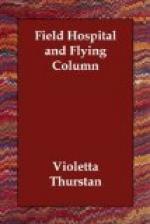We were so busy at the hospital that we did not see much of Warsaw. To the casual observer it looks a busy, modern, rather gay capital, but almost every inch of the city is interesting historically, and nearly all the pages of that history are red with blood. War, revolutions, and riots seem to have been almost its normal condition, and the great broad Vistula that flows sluggishly through it has been many a time before stained crimson with the blood of its citizens. But this time the war is being fought under different conditions. Russians and Poles are for the first time working together with a common aim in view. If the only outcome of this war was the better mutual understanding of these two great nations, it would not have been fought entirely in vain.
When we first arrived the Russians had beaten the Germans back to the frontier, and every one was elated with the great victory. Now at the end of October things did not look quite so happy. The people who knew looked anxious and harassed. The newspapers, as usual, told nothing at all, but the news which always filters in somehow from mouth to mouth was not good. Terrific fighting was going on outside Lodz, it was said, and enormous German reinforcements were being poured in. Warsaw was full to overflowing with troops going through to reinforce on the Russian side. A splendid set of men they looked, sturdy, broad-chested, and hardy—not in the least smart, but practical and efficient in their warm brown overcoats and big top boots.
There are two things one notices at once about the Russian soldier. One is his absolute disregard of appearances. If he is cold he will tie a red comforter round his head without minding in the least whether he is in the most fashionable street in Warsaw or in camp at the front. The other noticeable characteristic is the friendly terms he is on with his officers. The Prussian soldiers rarely seem to like their officers, and it is not to be wondered at, as they treat their men in a very harsh, overbearing way. On duty the Russian discipline is strict, but off duty an officer may be heard addressing one of his men as “little pigeon” or “comrade”




